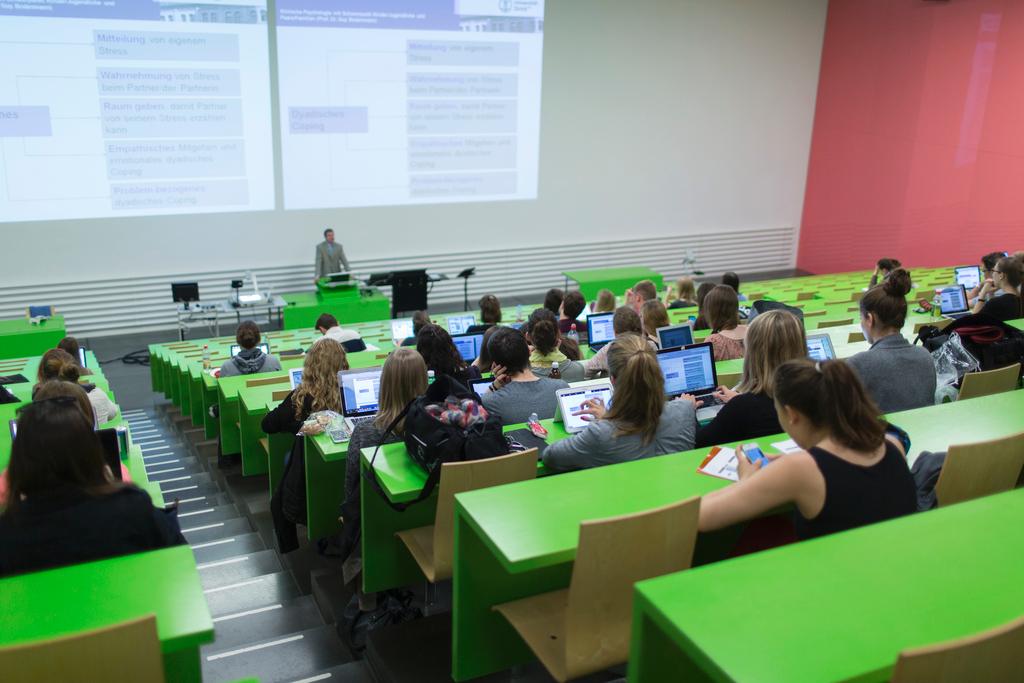
Private university thinks like a business to tackle skills shortage

Switzerland has some of the world’s top-ranked universities, but they still face criticism for failing to meet the needs of industry. One entrepreneur has responded by establishing a private university, to be run like a business for the needs of business.
Serguei Beloussov says he founded the Schaffhausen Institute of Technology (SIT) to challenge a “relatively inefficient system” of higher education. “Academia is focused on publications while business is focused on outcomes,” he told swissinfo.ch.
“Public universities are all well and good, but they could be better if they focused on specific problems,” he adds. “Science is knowledge, which needs to be converted into products that can solve challenges for society.”
SIT was founded a year ago in collaboration with the National University of Singapore and the Carnegie Mellon University in the United States. It will start welcoming students to Schaffhausen this September, now that it has a functional campus building.
SIT is not the first privately run higher education establishment to set up shop in Switzerland. The landscape includes various tourism and hospitality training centres, as well as the IMD Business School for management studies. But SIT plans to run itself more like a business than many traditional seats of learning.
The institute was awarded CHF3 million ($3.2 million) in funding from the canton of Schaffhausen in northern Switzerland. Fees for Masters programmes in computing science and software engineering (to be expanded later into areas like quantum technology) are set at CHF5,000 per semester (CHF2,500 for Swiss residents).
But SIT intends to generate the majority of its funding via a range of services and investments. These include a proposed technology park for start-ups, cooperation with university spin-off companies, consulting, real estate investments and research into areas such as robotics, artificial intelligence and digital health.
The self-financing model looks promising to Gaétan de Rassenfosse, chair of innovation and IP policy at the Swiss Federal Institute of Technology Lausanne (EPFL). “Private universities typically generate revenues by selling Masters degrees, which may create perverse incentives. Generating revenue from research and injecting it into education is an interesting idea,” he said.
Matthias Ammann, an education expert at the think tank Avenir Suisse, welcomed the private institute as a “fresh wind” that could promote diversity and increase competition in the Swiss higher education landscape. But SIT still needs to prove its worth through its performance, he added.
“If they want to attract high quality students they will need to start conducting profound research,” Ammann cautioned.
One of the issues that SIT wants to address is a lack of highly skilled IT workers needed to fill a growing number of demanding job positions. The industry in Switzerland has forecast a shortfall of thousands of suitable employees in the coming years.
Beloussov, a Singaporean national*, is only too aware of the talent challenge – he is also the founder and CEO of the IT company Acronis, which is incorporated in Schaffhausen and largely operates out of Singapore. SIT has the long-term goal of housing 2,500 students at its main campus in future, churning out a production line of IT managers and entrepreneurs.
When it comes to creating a workforce for industry, universities are only one part of the puzzle, according to education experts. “If the economy wants more programmers and engineers then we need to start meeting this demand in high schools and making these professions more attractive to women,” says Ammann.
De Rassenfosse also cautions against expecting tailored universities to provide all the answers to talent bottlenecks. “Switzerland already offers a rich mix of profiles, with vocational training tailored to industry needs and universities offering more generic education,” he said.
“The need to strengthen digital skills in the Swiss workforce will not be wholly met by the next generation of students. We need to re-train older generations of workers through further education programmes.”
One example is the EPFL Extension School that offers online courses around the theme of digital transformation, for students of all ages and educational backgrounds.
* An earlier version of this article incorrectly stated that Beloussov held dual Singaporean and Russian citizenship. He is a citizen of Singapore only.

In compliance with the JTI standards
More: SWI swissinfo.ch certified by the Journalism Trust Initiative




































You can find an overview of ongoing debates with our journalists here . Please join us!
If you want to start a conversation about a topic raised in this article or want to report factual errors, email us at english@swissinfo.ch.